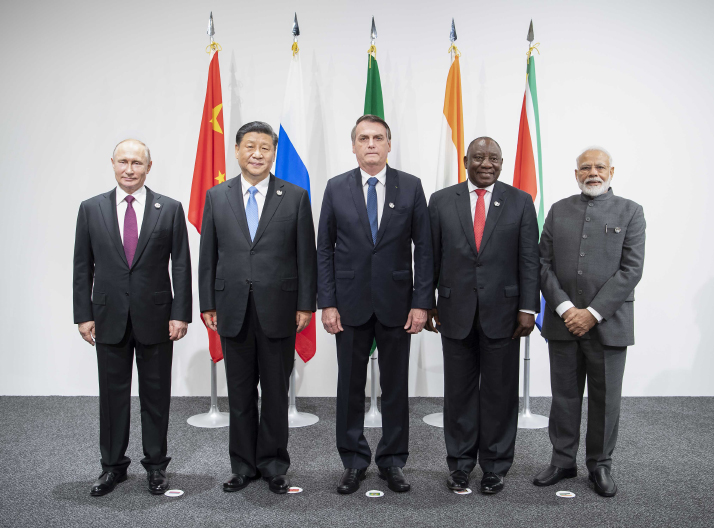| Opinion |
| Championing Globalization | |
| China offers solutions for global economic growth at G20 Summit | |
|
|
 Leaders of BRICS countries meet on the sidelines of the G20 Summit in Osaka, Japan, on June 28 (XINHUA)
With the world today witnessing a growing backlash against globalization and surging populism and protectionism, global governance faces greater difficulties. The spreading unilateralism has increased downward pressure on global economic growth, while trade protectionism is damaging the multilateral free trade system. With these developments, the G20 Summit in Osaka, Japan was an important gathering to provide a positive direction. Speaking with one voice Over the past two years, since the U.S. initiated a trade war with many of the world's major economies, the prospects for the world economy have turned pessimistic. At the beginning of this year, the International Monetary Fund and the World Bank lowered their forecasts for global economic growth in 2019. One of the achievements of the G20 Summit was that most of the members strongly opposed unilateralism and promoted free trade. Japanese Prime Minister Shinzo Abe, the host of the 14th summit, urged fellow leaders to send a strong message for maintaining and strengthening free, fair and non-discriminatory trade. He said Japan would strongly promote improvement of the multilateral trade system and negotiations for economic cooperation agreements. Chinese President Xi Jinping stressed at the Osaka Summit that countries should nurture a fair, just and non-discriminatory market environment instead of developing behind closed doors and artificially interfering in the market. The position of the Chinese and Japanese leaders reflects the common will of the international community. And their commitment to globalization and free trade has given a positive impetus to the world economy and raised expectations for global economic stability. A major focus was the meeting between Xi and U.S. President Donald Trump on the sidelines of the summit. Xi stressed that the past 40 years of bilateral relations have shown that both countries stand to gain from cooperation and lose from confrontation. Cooperation and dialogue are better than friction and confrontation, he emphasized. The U.S. president changed his rhetoric due to the Chinese side's sincerity and said the U.S. is willing to reach a mutually acceptable trade deal with China. The China-U.S. trade talks will restart and the U.S. will not impose any new tariffs. Echoing Xi, Trump also said that the U.S. will work together with China to advance a U.S.-China relationship featuring coordination, cooperation and stability. This sends a clear message to his hawkish advisers who have regarded China as a competitor, and demonstrates Trump's response to the arguments for "decoupling China and the U.S." and that a new cold war has begun. China and the U.S. not only agreed to restart trade talks but also reached a consensus on how to position China-U.S. relations in the future. The working teams of both sides will start negotiations to reach an agreement on the basis of mutual respect, equality and mutual benefit for the healthy development of China-U.S. economic and trade relations as well as contribute to the world economy.  A journalist at the media center of the 2019 Group of 20 (G20) Summit in Osaka, Japan, on June 27 (XINHUA)
Homegrown solutions Since the 2008 global financial crisis, China's role in the G20 has been on the rise, given the growing size of its economy. With the world at a crossroads and facing unprecedented downward pressure, countries around the world expect major economies like China to come up with solutions. While addressing this summit, Xi called on the other members to adhere to reform and innovation to find more impetus for growth, progress with the times and improve global governance; and to uphold the spirit of cooperation and resolve differences properly, which reflected the aspiration of the vast majority of member economies. Reform and opening up, equality and cooperation, and mutual benefit and win-win results—these are the core principles that China has always followed. Facts have proved that these ideals are the foundation of peaceful coexistence and a path to prosperity. This is why, in recent years, China has been more actively engaged in multilateral platforms such as the G20. China has not only contributed solutions to the world economic problems, but also set an example as a responsible major country with its concrete measures to deepen domestic reform and further opening up. Xi said on top of the steps China has taken, it will unveil further measures to break new ground in opening up and deliver high-quality development. The measures include releasing the 2019 edition of the negative list on foreign investment, which is shorter, with fewer areas out of bounds for foreign investors. It will set up six new pilot free trade zones (FTZs), open a new section of the China (Shanghai) Pilot FTZ and speed up building a free trade port in Hainan Province in south China. To expand imports, the overall tariff will be reduced, non-tariff barriers will be removed, and institutional costs of imports slashed. To improve the business environment, the new legal framework for foreign investment that will take effect on January 1 next year will have a punitive compensation mechanism to deal with intellectual property (IP) infringement cases. Civil and criminal laws will be tightened for better IP protection. All foreign investments and all types of businesses legally registered in China will be treated equally. A complaint mechanism will be set up for foreign companies. Greater efforts will be made to advance trade talks. China will promote facilitation and liberalization of trade and investment with neighboring countries as well as Europe. Chinese solutions and actions have helped to address the downward pressure on the world economy, safeguard the multilateral trading system, and promote mutually beneficial cooperation among all countries. The author is director of the Institute of World Economics with the China Institute of International Studies Copyedited by Sudeshna Sarkar Comments to yulintao@bjreview.com |
|
||||||||||||||||||||||||||||
|